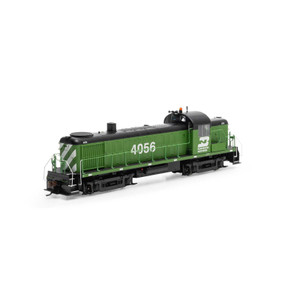
Athearn # ATH28779 HO RTR ALCo RS-3, Tsunami2 DCC Sound, BN#4054
Metal grab irons
Large or small fuel tank per prototype
Fine scale handrails
McHenry® scale knuckle couplers - Kadee® compatible
All-wheel drive with precision gears for smooth & quiet operation
All-wheel electrical pickup provides reliable current flow
See through etched metal radiator fan
See through cab windows
DCC-ready features Quick Plug™ plug-and-play technology
Improved 5-pole skew wound can motor with flywheels and multi-link drivetrain for with 21-pin NEM connector trouble-free operation
Wheels with RP25 contours operate on all popular brands of track
Window packaging for easy viewing
Highly-detailed, injection molded body
Painted and printed for realistic decoration
Fully assembled and ready-to-run
Interior plastic blister safely holds the model for convenient storage
Minimum radius: 18”
Newly designed can motor is more powerful and quieter than before
DCC-ready models feature 21-pin plug
DCC & sound models feature Tsunami2 sound with cube speaker
LED lighting for long life and reliable operation
Onboard Tsunami2 DCC/Sound decoder
Cube speaker for optimal sound quality
Sound units operate in both DC and DCC
Engine, horn, and bell sounds work in DC
Some functions are limited in DC
All functions NMRA compatible in DCC mode
Operating lighting functions with F5 and/or F6 (Flashing ditch lights, beacon, etc)
ALCO built the RS-3 to respond to competition with EMD, Fairbanks-Morse, and Baldwin Locomotive Works. In the case of ALCO, the builder added more improvements to create new locomotive lines beyond the RS-2. ALCO produced 377 RS-2s versus the more successful RS-3s at 1,418.
The new model produced slightly more horsepower than the earlier design at 1,600 hp using Alco’s 12-cylinder, model 244 prime mover. Visually, the RS3 very similar to the RS2. Both had much more styling then ALCO’s first diesel, the RS1. Additional curves with strong beveling to corners and edges giving the unit a much more streamlined appearance. At the time, some railroads elected to employ theirs RS3 diesels in passenger/commuter service. Many railroads appreciated this model for its versatility and reliability. RS3s were one of Alco’s shops more popular locomotives.